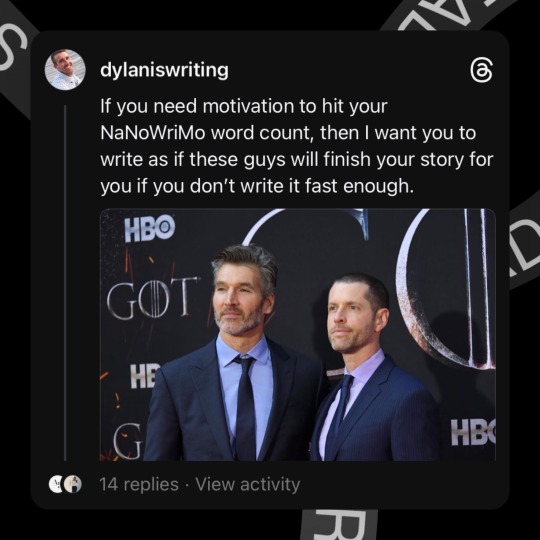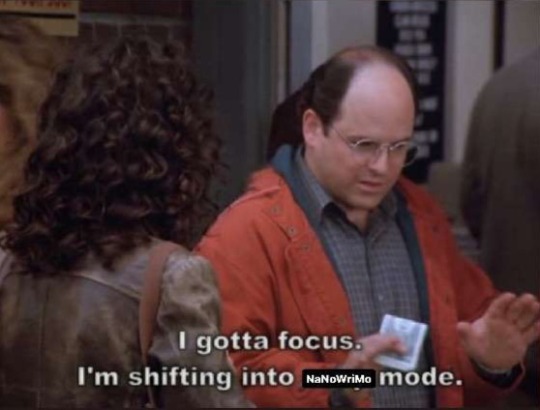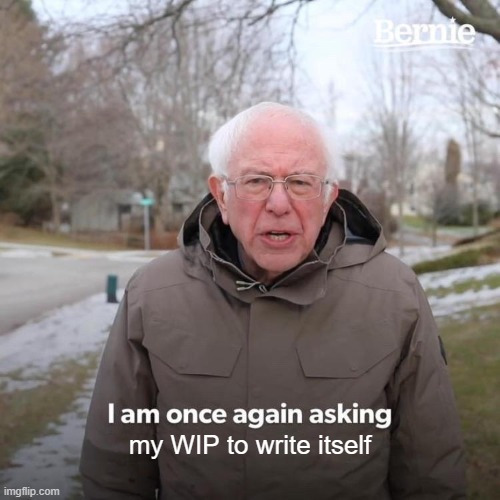Text

If you need motivation to hit your NaNoWriMo word count, then I want you to write as if these guys will finish your story for you if you don’t write it fast enough. (x)
2K notes
·
View notes
Text
"I like to write about it in fiction" does not mean "I desire it to happen in real life", and never has.
What you want to write about doesn't necessarily mean anything about you, besides that you want to write about it.
3K notes
·
View notes
Text
Did you guys know… that writing descriptions instead of dialogue… increases your word count faster ?
307 notes
·
View notes
Text

Standing in the Forest of Being Alive, Katie Farris
918 notes
·
View notes
Text
Stuck? Try junebugging.
I don't know who needs to hear this, but we're 5 days into nanowrimo so maybe this will be helpful.
Do you want the safety and surety of knowing what happens next in your story but can't stick to an outline? Does knowing in advance what will happen suck the joy out of discovery writing? Do you try to wing it through plots but get tangled in plot holes or have a story that runs out of steam because you can't figure out what went wrong? Are you at your most creative when you have a little bit of guidance? Do you tend to under-write? Do you get ideas in your head for random scenes and snippets that drop from the sky without context?
If any of these apply to you, junebugging a draft might be for you!
What Is Junebugging?
Since you're on Tumblr, you might already be familiar with the concept of junebugging as it relates to cleaning. If not -- I think the idea was first introduced to me by @jumpingjacktrash.
The basic idea is that you tackle cleaning by way of controlled chaos. You pick a specific area you want to focus on, like your kitchen sink, and then wander off to deal with other things as they occur to you, but always returning back to that area. You end up cleaning a little bit at a time in an order that may not make sense to an outsider but which keeps you from getting overwhelmed and discouraged.
How Does Junebugging Work in Writing?
OK, so that's great, but how does this work with writing? Well. In my case, the general idea is to jump between writing linearly, outlining, and writing out of order. It usually looks something like:
Start free-writing a scene, feeling my way through it and enjoying the discovery process.
Thinking, ok, now I have this scene, did anything need to happen to lead up to it? Do I need to go back and add some foreshadowing? Does this scene set anything up that needs to be paid off? And then jump forward/back to make those adjustments.
I'll usually have a bunch of disconnected ideas of ideas that have popped into my head, so I'll write those down in a list somewhere and then try to figure out what goes in between them and what order it goes in.
I'll write what I call "micro-scenes" which is where I'll just sketch out a few essential elements of what's going on without worrying too much about details, description, etc. -- just he did this, she said that, the setting was this, real bare-bones script. Then I can come back through and flesh out each of those microscenes into an actual scene later.
Got a story that has a complex structure? No problem. Write through each storyline one at a time and then chop them up and weave them together afterward. Write all the B plot scenes first then come back through to do A plot and C plot. Move the pieces around like legos. No one ever has to know.
This method works for me because I can't "decide" story elements in advance. I have never been able to just sit down and "figure out" what happens in a story beyond a couple steps ahead -- I have to discovery-write my way forward. But at the same time, that gets really daunting. So I zoom forward with micro-scenes, roughing out the beats in the most bare-bones way possible, then when I run out of clear vision for what happens next I backtrack, flesh out those scenes, build in connective tissue, etc. and by then I will probably find more inspiration to jump forward.
It's basically folding drafting, outlining, and revising all together into a single phase of writing, which is chaotic and goes against everything people teach you, but if it works? then it fuckin works.
Anyway, sorry for the jumbled-up post, I'm dashing this off quickly while I heat up a pizza and I'm about to dive back into my WIP -- but I hope this was a little helpful. If nothing else, take this as my blanket permission that it's 100% OK to jump around, write out of order, write messy, outline sometimes, pants sometimes, and do whatever else it takes just to get through the story. You've got this. Good luck.
929 notes
·
View notes
Text
Because I have just seen this specific thing for the second time, I would like to say:
If I reblog your art, I do not expect you to reblog (or share!) my fic in return
If I comment on your fic, I do not expect you to comment on (or read!) mine in return
My enjoyment of anyone's work does not come with strings or expectations
My friendship is not a bill that you will have to pay later
That's it!
12K notes
·
View notes
Text
Everyone should write badly and read trashy books actually it's fun
220 notes
·
View notes
Text
95 notes
·
View notes
Text
who is doing nanowrimo this year? how prepared are we feeling?
509 notes
·
View notes
Text
officially starting the last chapter of 'the beast in the glass house'. not getting up today except to get snacks, more water, and to go pee until i finish the book!
7 notes
·
View notes
Text
I haven't abandoned this story. I just put it on the back burner for now. The story is just on a small vacation. It is currently out of office. It can't come to the phone right now. It just fell under my bed to sleep with the monsters. It never left my head. It is everywhere - except on paper.
18K notes
·
View notes
Text
5 Tips to Avoid Burnout as a Neurodivergent Writer

When taking on a project as big as writing a novel, you may run into the risk of burnout. NaNo Participant Joana Hill gives some tips on avoiding burnout as a neurodivergent writer.
Burnout. As writers, we all know it. For neurodivergent writers, burnout can be even more damaging than usual. We can be much more sensitive, both mentally and emotionally, than our neurotypical friends and family.
This means avoiding burnout, and taking care of it when it does happen, can be even more important for us. I’m here today to provide some tips for my fellow neurodivergent writers to tackle just that.
1. Write What Interests You
Write what interests you rather than what you think you ‘should’ be writing. Many of us get caught-up in pleasing others. For neurodivergent people who’ve spent much of their life masking, or hiding their true personality and needs because of fear of rejection, it can be a hard habit to break.
If you want to write a 50k slow burn coffee shop AU of your favorite fandom, an epic space opera starring ants, or a main character with ADHD, autism, dyslexia, or any other disorder or condition you have, go for it.
2. Get A Support Network
For neurodivergent people, we’ve often lived our lives with special interests no one wants to hear us talk about. It often results in us not talking about them at all before someone can tell us they don’t want to hear about it.
Whether it’s offline with friends and family, or online here at NaNoWriMo or other sites, having people who are actively interested in listening to you and helping you plot and write can be a game-changer.
3. Celebrate As Many Victories As You Want
Many years, my personal goal is that I can get the new Pokemon game, which always comes out around the middle of November now, once I hit 50k. But you don’t need just one grand goal.
Get a bag of your favorite candy and say you can have a piece every so many words. Find something on Amazon you want (and can afford to get!) and say you’ll get it once you hit the halfway point. Whatever motivates you to keep going, set it into motion.
4. Plan For Flexibility
That may sound like an oxymoron, but hear me out. Neurodivergent people often love to have a plan. I know I can get frustrated and upset when I’m expecting something to happen and something different does. For a big goal like writing a novel in a month, a lot of things can end up going wrong.
Carry a notebook and pen or tablet with a keyboard case in case an errand takes longer than expected. Back your writing up to several places in case your main writing device crashes. Make sure at least one of those is a cloud service in case you end up writing on a device that isn’t yours. The more contingency plans you have, the better prepared you are when life happens.
5. Be Kind To Yourself
Some days you may not get the minimum goal, or you might not write at all. You may feel like you just can’t do it because you’re behind on your word count, or you decide you don’t like what you’ve written.
I get it. But don’t beat yourself up about it. Take a break. Play your favorite game or read your favorite book. Go for a walk. And remember that you’re awesome. No one can write this story like you can.
Joana Hill is a writer of young adult stories, as well as novellas inspired by Japanese light novels and anime. You can find her books, social media, and anything else you could imagine wanting to know about her on her LinkTree.
Photo by Andrea Piacquadio
595 notes
·
View notes
Text
Here's a little secret about NaNoWriMo: it isn't 50k or bust.
Take it from someone who's done it for 14 years. We love our 50k, yeah! Nice big, round number, has a good ring to it. It's traditional.
But listen, if 50k is too much for you? If you're finding yourself already wanting to drop out on Day 5 because you realized writing 1,667 words a day is kind of a lot actually? Stop trying to write that much!!
But don't stop writing.
(unless you need/want to do that too, in which case halt! go no further! take your rest!)
Otherwise, just simplify the goal. Or, don't even give yourself a goal if that sounds better. Just write how much you want to write, whenever you want to write it, and enjoy being surrounded by other writers doing the same.
No Wrimo with half an ounce of decency is gonna try to kick you out of the community because you decided not to go for the big 5-0. We're just happy to see you here. Check out the NaNo forums, the writeblr tags, your local in-person events, the discord servers, or just connect with a couple of creative friends and do NaNoWriMo the only way it's meant to be done: with joy for the craft, support for your fellow writers, and most importantly celebration for your work.
Forget 50k. You're just here to write, and the rest of us are here to cheer you on.
2K notes
·
View notes
Text
How to Use Meal Scenes to Develop Characters, Relationships, and Your World

Worldbuilding can sound complicated, but why not make it a little more simple by focusing on food? It may be the domestic touch you need! NaNo Participant Lacey Pfalz talks about using meal scenes to develop your world and your characters.
There’s one thing that remains a universal human truth: we love food! While our perspectives on food might differ, people all across the globe gather together during mealtimes — and thus, mealtimes are made memorable.
Meal scenes can also help your story in a few key ways, especially if it’s fantasy, science fiction or historical fiction.
Keep reading
1K notes
·
View notes


